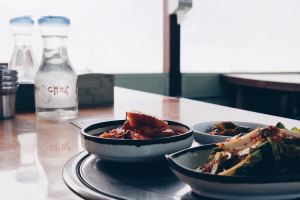
Photo by Henry & Co. on Unsplash
There were two things I knew when I walked into this small shop on Vermont and 3rd after : I was hungry and I wanted kimchi. In what form? It didn’t matter. I was craving it and no other place seemed promising or fast enough—not even the other restaurants in the mini plaza or across the street at the larger plaza. It was late and I was not about to drive down to Western to stop inside BCD for some sundubu or find a place with kimchi jjigae, which I hadn’t had the chance to taste test first. And I hate it when I’m hungry, I haven’t tasted the food, and then when it hits my tongue I’m regretting the decision to spend money on food.
So I walked in, passing tables and a small number of customers, and went directly to the counter to order. Since I didn’t trust my self-taught Korean, I ordered in English but was sure to pronounce two words correctly: kimchi kimbap.
As soon as the words left my mouth, someone behind the other counter started moving. When I finally got out of my head I noticed the man, possibly in his 60s or 70s, reaching for vegetables and then cutting them. But he kept stopping to look at me and when we made eye contact, he said,
“You like kimchi?”
I nodded a little awkwardly since I didn’t know him and was afraid to show my level of Korean. I was definitely going to acknowledge him, though; I was always taught to respect my elders.
He repeated the question. This time he added in more Korean and to not seem disrespectful, I tried out a few of the words I knew mixed with English. Someone else came to finish my kimbap order because, to my surprise, the conversation (is that what it was with my broken Korean? haha) lasted the entire time it took to finish my order. He was so interested in knowing just why and how I came to love kimchi and I enjoyed talking to him.
Something clicked in me during that conversation. I thought of how hard he had to have worked to have this business and live here and it reminded me of my own family elders and how hard they worked so I could even live in California. It made me think of how much the media got wrong about the LA Riots, Black people and Koreans, and how comfortable I felt in this space.
It made me want to study harder to become fluent in Korean. Out of love and respect for this 할아버님 and many others I knew and loved.
I left with a very clear, “수고하세요” (well done/thank you for helping me) and a very clear focus on what to do with my life in the future.

